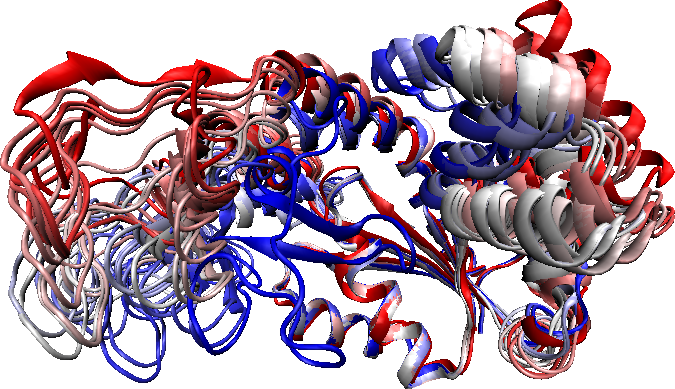Protein Structure, Kinematics, and Motion Planning
RSS 2009 Workshop
Monday, June 29th, 2009
Lydia E. KavrakiNoah Harding Professor of Computer Science and Bioengineering, Rice University
Professor, Graduate Program in Structural and Computational Biology
and Molecular Biophysics, Baylor College of Medicine
http://www.cs.rice.edu/~kavraki/
Kavraki Lab Homepage
Title
Robotics-Inspired and Dimension Reduction Methods for the Analysis of Protein Flexibility and FunctionAbstract
Proteins are involved either directly or indirectly in all biological processes in living organisms. It is now widely accepted that conformational changes of proteins can critically affect their ability to bind other molecules and that any progress in modeling protein motion and flexibility will contribute to the understanding of key biological functions. However, modeling protein flexibility has proved a very difficult task. This talk will first present recent computational work on modeling the flexibility and structure of proteins using a robotics-inspired approach. It will then discuss the development of non-linear dimension reduction methods tailored to proteins and the significant impact they can have in the analysis of protein flexibility. The talk will finish with some thoughts on the implications of the above works to the analysis of protein function and future directions.Bio
Lydia E. Kavraki is the Noah Harding Professor of Computer Science at Rice University. She also holds joint appointments at the Department of Bioengineering at Rice and the Department of Structural and Computational Biology and Molecular Biophysics at Baylor College of Medicine. Her research group develops physical algorithms with applications to robotics and structural bioinformatics. Kavraki received her Ph.D. in Computer Science from Stanford University working with Jean-Claude Latombe. Her awards include the Association for Computing Machinery (ACM) Grace Murray Hopper Award, an NSF CAREER award, a Sloan Fellowship, the Early Academic Career Award from the IEEE Society on Robotics and Automation, and the Duncan Award for excellence in research and teaching from Rice University. She is a Fellow of the Association for the Advancement of Artificial Intelligence, the American Institute for Medical and Biological Engineering and the World Technology Network. Kavraki currently serves as a Distinguished Lecturer for the IEEE Robotics and Automation Society. The research activities of her group are described at http://www.kavrakilab.orgRelevant Papers
- http://www.kavrakilab.org/bioinformatics/dimred
- http://www.kavrakilab.org/bioinformatics/Equilibrium
- http://www.kavrakilab.org/publications/keyword/functional+annotation+of+proteins
